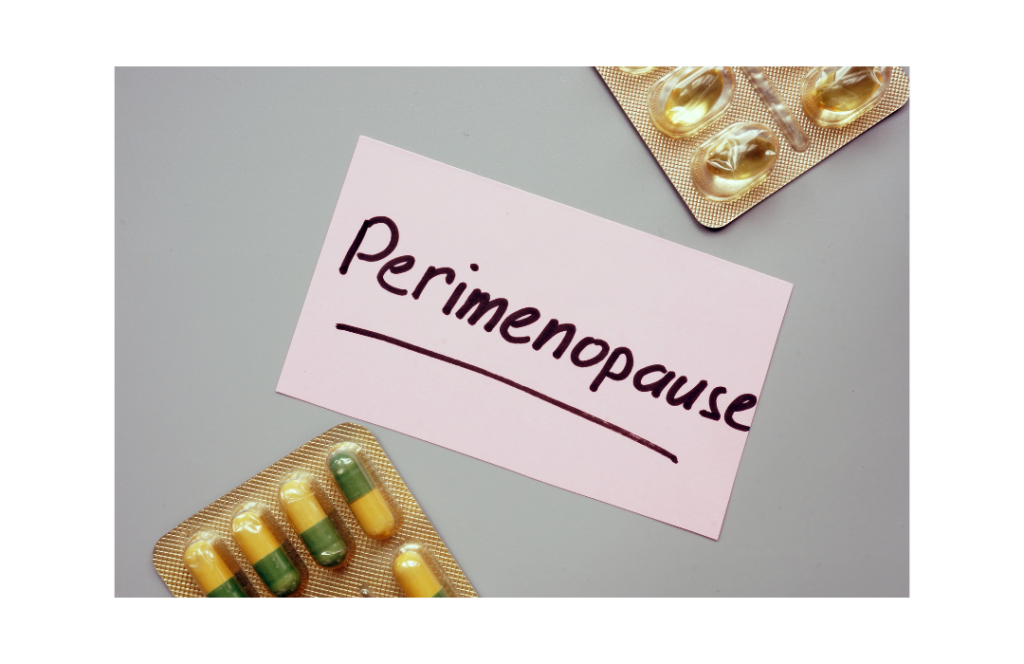Is it Perimenopause or Am I Just _____?

Is it perimenopause or am I just…
Tired? Stressed? Not eating enough? Doing too much cardio? Not sleeping? Not lifting weights? Under-eating protein? Nutrient deficient?
I’m noticing two major trends in the hormone space lately.
First, there’s an acceptance of feeling like absolute trash simply because of perimenopause. Many women believe that since it’s “just hormones,” there’s nothing they can do to change it. It’s seen as a part of the female reproductive journey, something to accept and endure.
Second, there’s a tendency to blame every unpleasant symptom on perimenopause, avoiding the possibility that lifestyle habits might be the real culprit.
I hate both of these sentiments. If you’ve been around here awhile, you know I HATE anything that makes a topic too black or white. The truth is always in the grey area. This is no different.
Yes, if you are a person with functioning female reproductive organs, you WILL go through a period of perimenopause, where your ovaries start their slow decline by giving you a surprise amount of estrogen every month, causing hormonal chaos. This period can last up to 10 years and start as early as 35.
No, that doesn’t mean you are destined to suffer with hot flashes, weight gain, anxiety & depression, cystic acne, poor sleep, or painful and chaotic periods that entire time. Many other factors impact the severity with which perimenopause hits you. The truth is, you CAN go through perimenopause and still feel amazing.
And lastly, no, you can’t blame all symptoms and complaints on your hormones. Many of the symptoms experienced in perimenopause are also the very same things you experience when you’re overly stressed, eating poorly, not sleeping, drinking too much alcohol, not exercising, and so on.
Now that’s out of the way, let’s get to the real meat of this blog: what you can do about all of this.
Is it really perimenopause?
I’m not trying to gaslight you or diminish the fact that perimenopause symptoms can SUCK. I’m simply pointing out that your late 30’s and 40’s are not just a time of hormonal change; it also happens to be a time in life (for most women) that is incredibly STRESSFUL. When I say stress, I don’t just mean the mental kind you feel at work or fighting with your partner. I also mean physical stressors like inflammation in the gut, poor digestive function, imbalanced blood sugar, etc.
We all come to this planet armed with our very own stress buckets. As we move through life, we fill that bucket with life stressors (like buying a house or getting a divorce) and physical stressors (like lack of sleep). If the bucket (our stress resiliency) starts overflowing, that’s when dysfunction and health issues start popping up. In my own experience (and working with clients), I’ve noticed that our late 30’s and 40’s are a time for majorly overflowing buckets. Thank you, careers and child-rearing!
Full stress bucket + perimenopause = feeling like trash.
Notice there are two parts to this equation. Here are the most common lifestyle factors that I see a lot, which mirror perimenopause symptoms and/or can make perimenopause worse:
- Under-eating calories: If you are a grown woman, you need more than 1,500 calories to function.
- Too much cardio: This is just dumping more stress into your bucket.
- Not enough sleep: We need at least 7 hours most nights.
- Under-eating protein: The more muscle you have, the better and easier your aging process will be.
- Not strength training: Again, more muscle means you’ll age better.
- Not prioritizing yourself: Boundaries and self-care are required, not a bonus.
- Too much alcohol: It’s just a fact, don’t come after me.
- Long-term hormonal birth control use: It keeps you from getting knocked up but depletes you of nutrients over time.
And just for funsies, let’s explicitly call out what those symptoms can be:
- Hot flashes
- Night sweats
- Mood swings
- Weight gain
- Sleep disturbances
- Irregular periods (length & severity)
- Fatigue
- Anxiety and depression
- Memory issues & brain fog
What you can do about it

At this point, you may be thinking, “Okay great, I feel called out and frustrated, thanks Amber. Now what?!”
Here’s the good news: you CAN change it.
You do have control over your destiny in this regard. While you can’t completely stop the hormonal shifts as you get closer to menopause, you can significantly improve your experience. You can work with your body, providing the nourishment (both food & life) that it needs to ease you into the next phase of life.
The first step in that direction is awareness, getting to know your body really well and taking a hard look at how you’re choosing to take care of yourself. With clients, I always start with lab work—it’s best to test and not guess at what we’re dealing with. Early on in perimenopause, women tend to have more estrogen in comparison to progesterone, and it’s helpful to confirm this so that we know where to start. Additionally, a full blood work-up and maybe even gut health testing (depending on the situation) can be extremely valuable.
Now, let’s get to the actionable steps you can take to improve your perimenopause experience. And remember, even if you’re not in perimenopause, these tips will help tackle the lifestyle factors that often create similar symptoms:
- Prioritize Nutrition:
- Ensure you are eating enough calories to support your body’s needs. Aim for a balanced diet rich in whole foods, plenty of fruits, vegetables, lean proteins, and healthy fats.
- Increase your protein intake. Protein is essential for muscle maintenance and can help stabilize blood sugar levels, which is crucial during hormonal fluctuations.
- Incorporate Regular Exercise:
- Focus on strength training 3-4 times a week to build and maintain muscle mass, which is vital for metabolic health and reducing body fat.
- Incorporate low-impact cardio, like walking or swimming, to improve cardiovascular health without over-stressing your body.
- Improve Sleep Hygiene:
- Aim for at least 7-8 hours of quality sleep per night. Create a bedtime routine that promotes relaxation and stick to a consistent sleep schedule.
- Reduce screen time before bed and consider incorporating calming activities like reading or meditation.
- Manage Stress:
- Implement stress-reducing practices such as yoga, deep breathing exercises, or mindfulness meditation. These can help reduce cortisol levels and improve overall well-being.
- Set boundaries and prioritize self-care. Remember, taking time for yourself is not selfish; it’s essential for your health.
- Stay Hydrated:
- Drink plenty of water throughout the day to help manage symptoms like hot flashes and dry skin. Aim for at least 80 ounces of water daily, and consider adding electrolytes if you’re very active or sweating a lot.
These tips are a great starting point, but everyone’s journey through perimenopause is unique. It’s important to listen to your body and make adjustments based on how you feel.
If you’re ready to take control of your health and navigate perimenopause with confidence, I’m here to help. Working with a professional can provide personalized insights and strategies tailored to your specific needs. You can reach out to me directly to learn more about my 1:1 coaching programs, or if you’re looking for an accessible way to start making changes today, join my Nourish Yourself First Challenge. This challenge offers 10 low-effort steps to kick-start your hormone journey, delivered directly to your inbox.
Perimenopause doesn’t have to be a daunting experience. With the right support and lifestyle adjustments, you can feel empowered and vibrant during this transition and beyond.